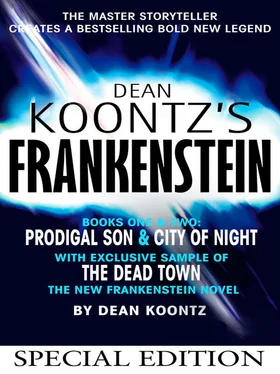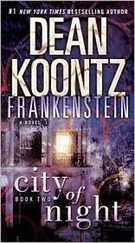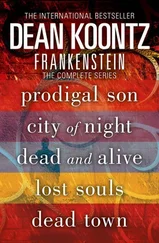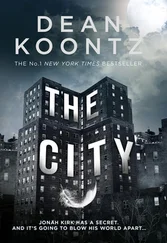As noon drew near, when she was certain that the household staff had cleaned the master suite and made the bed, she went upstairs.
If the maids had found something extraordinary or just peculiar in the bedroom, if they had uncovered even a few rat droppings, she would have been told. Whatever had been in the bedroom the previous night must not be there now.
She prowled the suite anyway, listening for furtive sounds, looking behind furniture.
In the night, gripped by a surprising fear of the unknown, she had retreated. Fear, an important survival mechanism, had not been entirely denied to the New Race.
Superstition, on the other hand, was uncontestable proof of a weak mind. Victor had no tolerance for superstition. Those with weak minds would be recalled, terminated, replaced.
The most innocent-seeming superstition—such as a belief that ill fortune attended every Friday the thirteenth—could open a door in the mind to consideration of larger supernatural issues. The most essential purpose of Victor’s revolution was to complete the work of modernity and create a race of absolute materialists.
Erika searched the suite to quell the quasi-superstitious dread that had seized her the previous night and that still lingered. When she found nothing untoward, her confidence returned.
She enjoyed a long hot shower.
Members of the New Race, even Alphas like her, were encouraged to develop a keen appreciation for simple physical pleasures that could serve as an inoculation against emotions. Emotions themselves could be a form of pleasure, but also an antirevolutionary force.
Sex was among the approved pleasures, pure animal sex divorced from affection, from love. Sex between members of the New Race was also divorced from reproduction; they were engineered to be sterile.
Each new man and woman owed his or her existence to the direct action of Victor. The family was an antirevolutionary institution. Family fostered emotion.
Victor trusted no one but Victor to create life only for purely intellectual, solely rational reasons. Life from the lab will one day entirely replace life from the loins.
Shower completed, Erika opened the door of the stall, fished a towel from the nearby rack, stepped onto the bath mat—and discovered that she’d had a visitor. The splash of water and the clouds of steam had masked the movements of the intruder.
On the mat lay a scalpel. Stainless steel. Sparkling.
The scalpel must be one of Victor’s. He owned collections of surgical instruments acquired at various times during his two-century crusade.
Victor, however, had not put this blade on her bath mat. Nor had any member of the household staff. Someone else had been here. Something else.
Steam swirled around her. Yet she shivered.
FOLLOWING THEIR STOP at the morgue, Michael made a play for the car keys, but Carson as usual took the wheel.
“You drive too slow,” she told him.
“You drive too asleep.”
“I’m fine. I’m cool.”
“You’re both,” he agreed, “but you’re not fully awake.”
“Unconscious, I wouldn’t drive as slow as you.”
“Yeah, see, I don’t want to test that claim.”
“You sound like your father’s a safety engineer or something.”
“You know he’s a safety engineer,” Michael said.
“What’s a safety engineer do, anyway?”
“He engineers safety”
“Life is inherently unsafe.”
“That’s why we need safety engineers.”
“You sound like probably your mother was obsessed with safe toys when you were growing up.”
“As you know perfectly well, she’s a product-safety analyst.”
“God, you must have had a boring childhood. No wonder you wanted to be a cop, get shot at, shoot back.”
Michael sighed. “None of this has anything to do with whether you’re fit to drive or not.”
“I am not only fit to drive,” Carson said, “I am God’s gift to Louisiana highways.”
“I hate it when you get like this.”
“I am what I am.”
“What you are, Popeye, is stubborn.”
“Look who’s talking—a guy who will never accept that a woman can drive better than he can.”
“This isn’t a gender thing, and you know it.”
“I’m female. You’re male. It’s a gender thing.”
“It’s a nut thing,” he said. “You’re nuts, I’m not, so I ought to drive. Carson, really, you need sleep.”
“I can sleep when I’m dead.”
The day’s agenda consisted of several interviews with friends of Elizabeth Lavenza, the floater without hands who had been found in the lagoon. After the second of these, in the bookstore where Lavenza had worked as a clerk, Carson had to admit that sleep deprivation interfered with her ability as an investigator.
Returning to the sedan, she said, “Okay, I gotta grab some sack time, but what’ll you do?”
“Go home, watch Die Hard .”
“You’ve watched it like fifty times.”
“It just gets better. Like Hamlet . Give me the car keys.”
She shook her head. “I’ll take you home.”
“You’ll drive me head-on into a bridge abutment.”
“If that’s what you want,” she said, getting behind the wheel.
In the passenger’s seat, he said, “You know what you are?”
“God’s gift to Louisiana highways.”
“Besides that. You’re a control freak.”
“That’s just a slacker’s term for someone who works hard and likes to do things right .”
“So I’m a slacker now?” he asked.
“I didn’t say that. All I’m saying, in a friendly way, is you’re using their vocabulary.”
“Don’t drive so fast.”
Carson accelerated. “How many times did your mother warn you not to run with scissors in your hand?”
“Like seven hundred thousand,” he said. “But that doesn’t mean you’re fit to drive.”
“God, you’re relentless.”
“You’re incorrigible.”
“Where’d you get that word? The dialogue in Die Hard isn’t that sophisticated.”
When Carson stopped at the curb in front of Michael’s apartment house, he hesitated to get out. “I’m worried about you driving home.”
“I’m like an old dray horse. I know the route in my bones.”
“If you were pulling the car, I wouldn’t worry, but you’re gonna drive it at warp speed.”
“I’ve got a gun, but you aren’t worried about that.”
“All right, all right. Drive. Go. But if you get behind a slow motorist, don’t shoot him.”
As she drove away, she saw him in the rearview mirror, watching her with concern.
The question wasn’t whether she had fallen in love with Michael Maddison. The question was how deeply, how irretrievably?
Not that love was a sucking slough from which a person needed to be retrieved, like a drowner from the wild surf, like an addict from addiction. She was all for love. She just wasn’t ready for love.
She had her career. She had Arnie. She had questions about her parents’ deaths. Her life didn’t have room for passion right now.
Maybe she’d be ready for passion when she was thirty-five. Or forty. Or ninety-four. But not now.
Besides, if she and Michael went to bed together, departmental regulations would necessitate a new partner for each of them.
She didn’t like that many other homicide detectives. The chances were that she’d be paired with a fathead. Furthermore, right now she didn’t have the time or patience to break in a new partner.
Not that she always obeyed departmental regulations. She wasn’t a by-the-book i-dotter and t-crosser.
But the rule against cops copulating with cops and then sharing an assignment struck Carson as common sense.
Читать дальше












